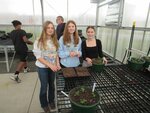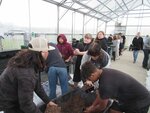

This past week, I had an opportunity to spend a little time with Dave Rutherford, who is the Napavine School District career and technical education (CTE) director.
Rutherford took time out of his schedule to show me the innovative programs the Napavine School District is implementing.
Is this related to agriculture? Definitely.
We started my tour and education of their program inside the high school where he showed me the newly constructed culinary arts classroom. The plan is to hire a teacher and start classes in the fall of 2024. Agriculture related? Again, yes. Just wait. The plan is for students to learn employable skills while creating good, quality, nutritional foods.
We then made a quick walk through the agriculture classroom and shop on our way outside to the brand new 255-by-50-foot greenhouse. This building was erected this past summer and is in its first year of use. Napavine Middle School students study hydroponics, among other things, and the eighth graders now operate the greenhouse. They are currently doing cuttings, starting seeds and preparing for a Mother’s Day plant sale.
This is such a good way for students to be exposed to agriculture on a small scale and perhaps pique their interest in growing various types of food stuffs and other, perhaps ornamental, plants. It opens their eyes to the possibilities of future hobbies, employment and ownership in the field of agriculture.
While we were outside, Rutherford talked to me about the building he hopes to have erected this coming summer. These are wonderful plans, including an agriculture and STEM (science, technology, engineering and mathematics) lab. This building will allow many teachers access to equipment that cannot be housed in a single classroom — making it available to many more students and applications.
The study of genetics, working with tissue cultures, developing robotics applications — the list goes on and on. This building will involve students in learning academics in a practical, usable way. It will add relevance to their learning — the best motivation there is.
Indulge me for a moment while I digress to prove my point.
I remember when I taught at Centralia High School and my sons went to school there. I am sure I was not a “favorite parent” with some teachers. When my sons complained about something they were being “forced to learn,” I told them to ask their teacher how it was relevant to their life, and if the teacher could not show relevance, they had no reason to be requiring that students learn it.
I remember one specific incident with one of my sons. He came home not happy about having to do some number of problems around the Pythagorean Theory. He saw no purpose in wasting his time to learn it. I gave my usual mom speech about asking the teacher to tell him how he could apply it in his personal life. Then, so he would do his homework without hating having to do it, I asked him how he squared up the forms for a foundation out in the middle of an open area (which he had done on the job several times already). He promptly quipped “3-4-5.”
Bingo.
He figured out the relevance and went upstairs to his desk and completed the assigned homework. He saw the relevance and therefore a reason to learn it.
So — back to Napavine and their program moving forward — the agriculture and STEM lab building will be a wonderful, relevant addition to their burgeoning CTE program. The area around the building will feature raised beds for growing foods for (wait for it) the culinary class! Seeing a connection?
All these programs are interconnected. Just like life.
Napavine is on the move and preparing students for a bright future. The introduction to agriculture class focuses on the primary components of agriculture — animals, plants, mechanics, business and natural resources. The agricultural mechanics class teaches safety in a woodshop and metal shop while learning to operate various pieces of machinery. The students can earn industry-related certificates in forklift training, food handlers card, first aid/CPR/AED and veterinary tech. They can train on computer numerical control, metal mill and CNC metal lathe, and they can pursue a commercial electrical track, carpentry track or fine woodworking track.
This is knowledge and skills that will serve them well as they move on with their lives.
Agriculture — we all need it.
•••
Maureen Harkcom is president of the Lewis County Farm Bureau. She can be reached at maureen.harkcom@gmail.com.